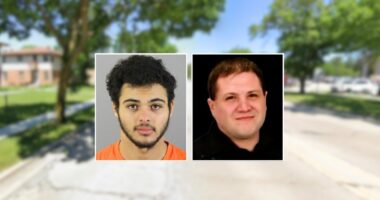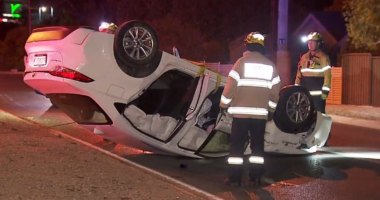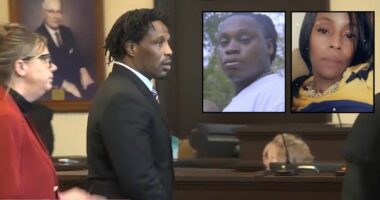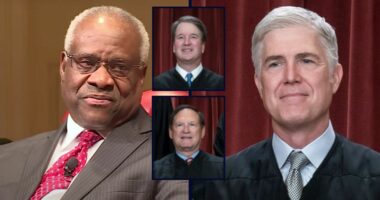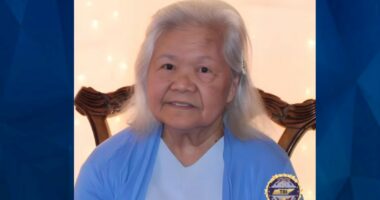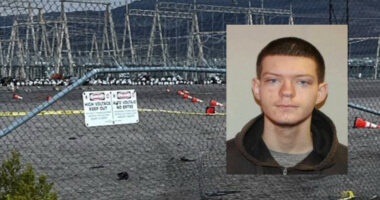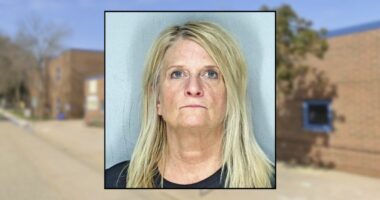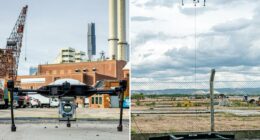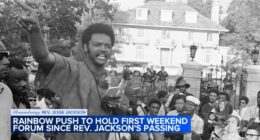Share this @internewscast.com
Denver7 is following the second of three trials in the case of Elijah McClain, a 23-year-old unarmed Black man who died a few days after he was violently arrested by Aurora police on Aug. 24, 2019.
Aurora Police Department (APD) Officer Nathan Woodyard is charged with reckless manslaughter and criminally negligent homicide in the death of McClain. Previously, a jury found APD Officer Randy Roedema guilty of criminally negligent homicide and third-degree assault. Former APD Officer Jason Rosenblatt, who was fired by the department less than a year after McClain’s death, was acquitted of all charges.
Jury finds one Aurora officer guilty, one not guilty in 1st Elijah McClain trial
Woodyard, who is currently suspended from the APD, is accused of putting McClain in a carotid hold that rendered him unconscious before paramedics arrived to administer ketamine, a powerful sedative. The 23-year-old massage therapist encountered police on Aug. 24, 2019 after a person called 911 to report a “sketchy” man walking in Aurora.
Officers with the Aurora Police Department (APD) responded and put McClain, who was unarmed and had not committed a crime, into a neck hold. Paramedics administered the ketamine, which officials said led to cardiac arrest on the way to the hospital.
He was declared brain dead days later and died Aug. 30, 2019. A pathologist found he was given a higher dose of ketamine than recommended for somebody of his size and, as a result, he overdosed. The City of Aurora settled a civil lawsuit with McClain’s family in November 2021 for $15 million.
Woodyard, along with two paramedics who have yet to face jury trials, have pleaded not guilty to the charges against them in January 2023 in the wake of a grand jury indictment.
Two Aurora Fire Rescue paramedics — Peter Cichuniec and Jeremy Cooper — have trials beginning Nov. 17 and 27, respectively, for charges of reckless manslaughter, criminally negligent homicide and assault, plus sentence enhancers. The paramedics are accused of injecting a significant amount of ketamine into McClain, causing him to overdose.
Scroll down to read updates from the Nov. 1 proceedings.
Wednesday, Nov. 1
Day nine of Woodyard’s trial began on Wednesday morning with the defense calling Aurora Sgt. Dale Leonard as a witness. He has worked with the APD for a little more than 20 years and been a sergeant for about seven years.
On the evening of Aug. 24, 2019, he was working and responded to the call regarding the McClain case after hearing an officer at that scene call for an ambulance. He recalled that it took about a minute to 90 seconds for him to respond, using his vehicle’s sirens and lights, he told defense attorney Megan Magdalena Downing in court.
When he arrived, Leonard said he remembered seeing the three officers — Woodyard, Roedema and Rosenblatt — trying to gain control of a person on the ground. He called the scene “chaotic” as the officers tried to put handcuffs on McClain. The officers told Leonard that the carotid hold had been used on McClain. He confirmed that afterward, they saw McClain was breathing, but did not recall if any officers checked for a pulse. Aurora Fire Rescue, which has paramedics, was called to the scene, he said.
Leonard said he did not recall McClain saying that he could not breathe, and it did not appear that way when he was at the scene. After the carotid hold, McClain was placed in the recovery position, which was on his side. At that point, Woodyard left McClain’s side while other officers stayed with him, Leonard testified.
He recalled feeling concerned about McClain’s deteriorating condition as they waited for Aurora Fire Rescue to arrive. He also remembered hearing McClain vomit and instructing the officers to make sure he was on his side and breathing. He used the radio a few times to ask why Aurora Fire Rescue was taking so long to arrive. He estimated it was about 15 minutes. In a clip of the radio played in court, he noted the sound of his voice, and how he appeared “greatly concerned” because McClain was not speaking as clearly and was less interactive.
After paramedics arrived, he said his concern for McClain’s condition continued, but at that point, the paramedics were the medical experts at the scene.
During a cross-examination by senior prosecutor Jason Slothouber, Leonard said the top priorities for the APD is officer safety, suspect safety and safety to the public. He also confirmed that when confronting a suspect, it is mandatory, when practicable, for APD to to use de-escalation techniques, like a conversation, before going hands-on with a person. He also said that the paramedics are the ones who decide what medications to administer, while law enforcement is the one in charge of scene safety and control of a suspect.
Slothouber asked if the only way for Aurora Fire Rescue to know what had happened to a suspect, like any medical events, is if they are alerted by the officers who originally responded to the scene. Leonard said yes, adding that he had told the paramedics about the carotid hold, McClain’s loss of consciousness and him vomiting.
After the paramedics had injected the ketamine, McClain was angled downward, with both shoulders on or near the grass, Leonard said. It appeared like his stomach was flat on the ground, he said. He said this is the prone position — not the recovery position. He said he never saw Woodyard holding McClain in the prone position. However, he noted that Aurora Fire Rescue was in charge of the scene at this point, though he added that police are in charge of how a person is restrained. He said officers could have put McClain back in the recovery position after the injection.

Aurora Police Department
During a redirect following the mid-morning break, Leonard said he didn’t put McClain into the recovery position himself because he was having discussions with the several other people who were at the scene, and other officers were with McClain. Aurora police have “no medical training,” he said, aside from using tourniquets and some CPR, but officers are not trained on treatments.
He recalled being concerned about seeing vomit in McClain’s mask at the scene, but not thinking about any medical treatments or issues that could be connected to it, since police officers are not medical experts.
Judge Mark D. Warner, who had a meeting scheduled for Wednesday afternoon, then called for an early lunch recess and the jury was dismissed.
After that, Judge Warner reminded Woodyard that he has the opportunity to testify, should he want to, and that the jury cannot infer any guilt based on his decision.
Woodyard confirmed he had decided to testify.
At this point, defense attorney Downing stated that the defense had seen a pattern of objections in the trial that had become “exhaustive” and “compromising (to the) constitutional presentation of the defense.” She said they had asked for a mistrial on Tuesday and wanted to further explain the defense’s reasoning for the request.
The prosecution argued against this. Judge Warner ultimately decided that there would not be a mistrial as of now. The rest of the courtroom then broke for lunch.
PREVIOUS COVERAGE OF THE TRIAL OF OFFICER WOODYARD
Day 1 — Tuesday, Oct. 17
Day 2 – Wednesday, Oct. 18
Day 3 – Thursday, Oct. 19
Day 4 – Friday, Oct. 20
(No court on Monday, Oct. 23)
Day 5 – Tuesday, Oct. 24
Day 6 – Wednesday, Oct. 25
(No court on Thursday, Oct. 26)
Day 7 – Friday, Oct. 27
(No court on Monday, Oct. 30)
Day 8 – Tuesday, Oct. 31
Day 9 – Wednesday, Nov. 1 (this story)
Elijah McClain | Complete 360 In-Depth Coverage
1:10 PM, Sep 19, 2023
Denver7 in-depth coverage of Elijah McClain case
